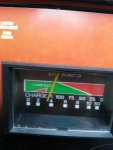phoenixgold2100
Petty Officer 2nd Class
- Joined
- Feb 3, 2013
- Messages
- 154
Re: charging deep cycle
I have been charging this battery for a 3.5 hours now and it is at 13.46 volts. while hooked to the charger the charger I am using is a motomaster 11-1568-8 manual charger with a meter on the front.
The needle started around the 100 and has moved to the 4? Should it go all the way to the 0 when it's done and the volts at the battery be 14?

I have been charging this battery for a 3.5 hours now and it is at 13.46 volts. while hooked to the charger the charger I am using is a motomaster 11-1568-8 manual charger with a meter on the front.
The needle started around the 100 and has moved to the 4? Should it go all the way to the 0 when it's done and the volts at the battery be 14?




















